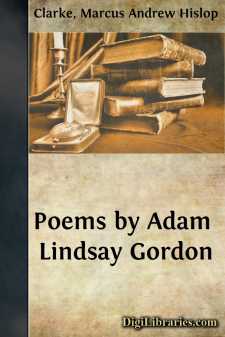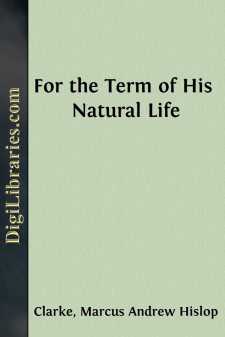Categories
- Antiques & Collectibles 13
- Architecture 36
- Art 48
- Bibles 22
- Biography & Autobiography 813
- Body, Mind & Spirit 142
- Business & Economics 28
- Children's Books 15
- Children's Fiction 12
- Computers 4
- Cooking 94
- Crafts & Hobbies 4
- Drama 346
- Education 46
- Family & Relationships 57
- Fiction 11829
- Games 19
- Gardening 17
- Health & Fitness 34
- History 1377
- House & Home 1
- Humor 147
- Juvenile Fiction 1873
- Juvenile Nonfiction 202
- Language Arts & Disciplines 88
- Law 16
- Literary Collections 686
- Literary Criticism 179
- Mathematics 13
- Medical 41
- Music 40
- Nature 179
- Non-Classifiable 1768
- Performing Arts 7
- Periodicals 1453
- Philosophy 64
- Photography 2
- Poetry 896
- Political Science 203
- Psychology 42
- Reference 154
- Religion 513
- Science 126
- Self-Help 84
- Social Science 81
- Sports & Recreation 34
- Study Aids 3
- Technology & Engineering 59
- Transportation 23
- Travel 463
- True Crime 29
Marcus Andrew Hislop Clarke
Marcus Andrew Hislop Clarke (1846–1881) was an English-born Australian novelist and journalist, best known for his classic work "For the Term of His Natural Life" (1874), a harrowing tale about the Australian convict system. Clarke emigrated to Australia in 1863, where he pursued a career in writing and became a prominent figure in literary circles. His works often depicted the harsh realities of colonial life and the struggles of convicts, influenced by his experiences and the landscape of Australia. Clarke also contributed to Australian journalism and was regarded as a key figure in the development of Australian literature.
Author's Books:
Sort by:
IN MEMORIAM. (A. L. Gordon.) At rest! Hard by the margin of that seaWhose sounds are mingled with his noble verse,Now lies the shell that never more will houseThe fine, strong spirit of my gifted friend.Yea, he who flashed upon us suddenly,A shining soul with syllables of fire,Who sang the first great songs these lands can claimTo be their own; the one who did not seemTo know what royal place awaited...
more...
PROLOGUE. On the evening of May 3, 1827, the garden of a large red-brick bow-windowed mansion called North End House, which, enclosed in spacious grounds, stands on the eastern height of Hampstead Heath, between Finchley Road and the Chestnut Avenue, was the scene of a domestic tragedy. Three persons were the actors in it. One was an old man, whose white hair and wrinkled face gave token that he was at...
more...



